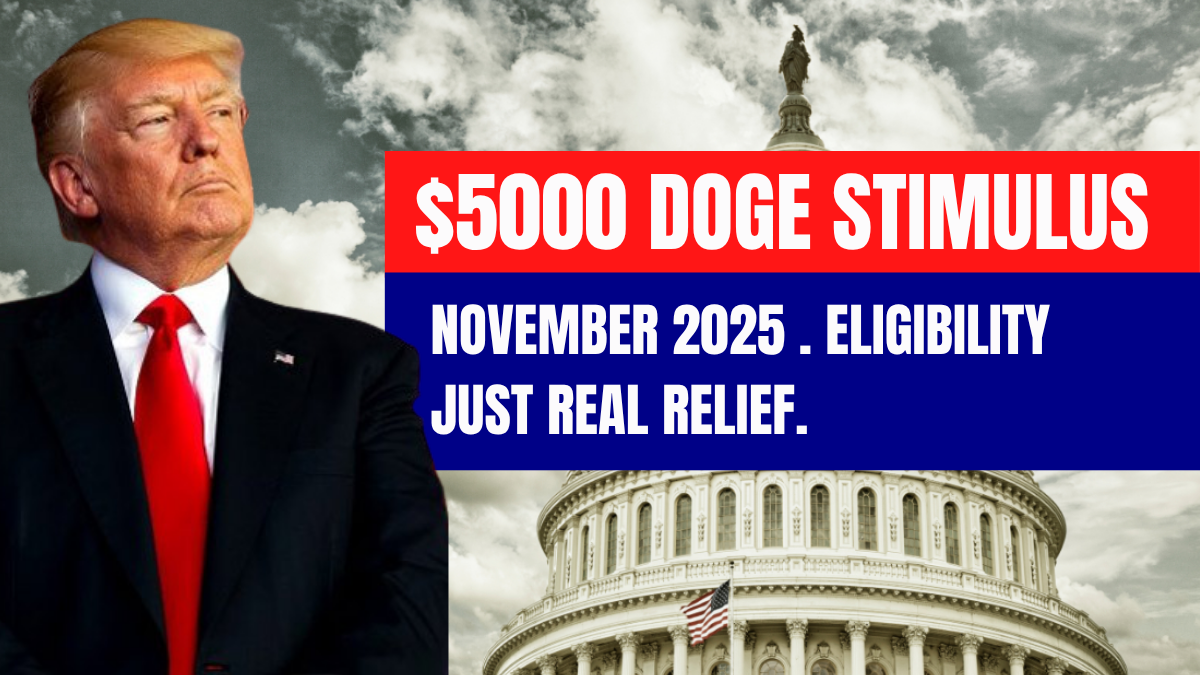Millions of american’s will be eligible for the Trump administration DOGE Dividend Program, a citizen friendly new policy set to launch in November 2025, which promises $5,000 payments to eligible American households. This initiative, overseen by the Department of Government Efficiency (DOGE), aims to “refund” taxpayers a share of government savings achieved by cutting waste and streamlining operations. Here’s all you need to know about what the program involves, how it works, and what Americans need to know.
What is the DOGE Dividend Program?
The DOGE Dividend Program is a government backed benefit in which 20% of savings identified by DOGE will be redistributed to US households. If DOGE achieves its projected $2 trillion in savings, approximately $400 billion will fund the rebate pool—translating to $5,000 per eligible household. Treasury officials characterise these payments as a “dividend from national efficiency,” giving Americans a direct stake in government cost-cutting efforts.
Why November 2025?
The program’s timing aligns with the end-of-year federal budget cycle, when surpluses are determined. Coupled with the holiday shopping season, the payout is designed to boost both consumer confidence and economic activity. Government agencies, banks, and the IRS are preparing for mass direct deposits to begin the week of November 24–30, 2025, with paper checks sent soon after.
Payment Amount and Eligibility Rules
- Payment Size: Each qualifying household will receive $5,000.
- Joint Filers: Married couples filing jointly will get one $5,000 payment, with some receiving multiple deposits based on separate filings.
- Dependency: Initial payments do not increase for dependent children, though future updates may alter this.
To qualify, you must:
- Be a US citizen or lawful resident with a valid Social Security Number.
- Have filed a federal income tax return for 2023 or 2024, proving you paid more in taxes than received in federal benefits.
- Fall under an income cap of $125,000 for individuals or $250,000 for couples (early estimates).
- Non-filers (retirees, low-income) can register through an IRS portal opening in October 2025.
Eligibility will be verified using IRS tax data, minimizing errors and fraud.
How Payments Are Made
The payments will mostly arrive by direct deposit using banking details held by the IRS. Those without bank accounts will receive checks or prepaid debit cards. Statement descriptions will read either “DOGE Dividend $5,000” or “Treasury Dept – DOGE Dividend.” IRS confirmation letters will follow within 15 days of payment. The non-filer portal deadline closes December 15, 2025.
Purpose and Goals
The DOGE Dividend is intended to:
- Reward taxpayers with a share of government efficiency savings.
- Stimulate the economy ahead of the holidays through direct payments.
- Promote accountability by tying government staff incentives and public benefits to actual efficiency gains.
President Trump describes it as a way to return money saved from waste directly to taxpayers, making citizens “stakeholders” in fiscal discipline.
Economic Impact
- Spending Boost: A surge in household spending may benefit retail, services, housing, auto, and investment sectors.
- Inflation Concerns: Officials claim inflation risk is minimal, given moderate current rates, but economists caution some price impact is likely.
- Confidence Spike: Citizens rewarded directly by government action may feel more optimistic, fueling positive market sentiment.
Some skepticism persists about achieving the $2 trillion savings; DOGE’s initial savings were $55 billion. Further reforms and consolidation are planned to reach the long-term target.
Steps to Prepare for the Dividend
- File and process your 2023 or 2024 taxes.
- Check and update your IRS banking information.
- Follow IRS.gov updates, especially if you’re a non-filer.
- Beware of scams and unofficial “early access” offers.
- Consider using your payout for debt reduction, savings, investments, or essential expenses.
Challenges and Questions
- Congressional Approval: Lawmakers may require additional legislation and debate using these funds to pay down national debt.
- Program Longevity: It remains unclear if this is a one-time payout or will recur annually.
- Payment Infrastructure: Ensuring smooth, timely payments for all, especially unbanked, will test the IRS.
- Tax Status: It’s not confirmed whether DOGE Dividends are taxable income.
- Verification Timeline: Some payments may be delayed for amended or late tax returns.
The Bottom Line
For many Americans, the DOGE Dividend’s $5,000 payout could be a game-changer—helping pay bills, support families, and boost financial security. It’s also a symbolic move, linking fiscal responsibility with direct citizen benefit. Even those not receiving the check may benefit from the positive economic ripple effects.
To prepare, confirm your tax status and banking information, watch for official IRS notices, and consider smart financial planning for the windfall. This ambitious plan could set a new standard for “people-first economics,” marking a historic turning point in how government efficiency benefits everyday Americans.
